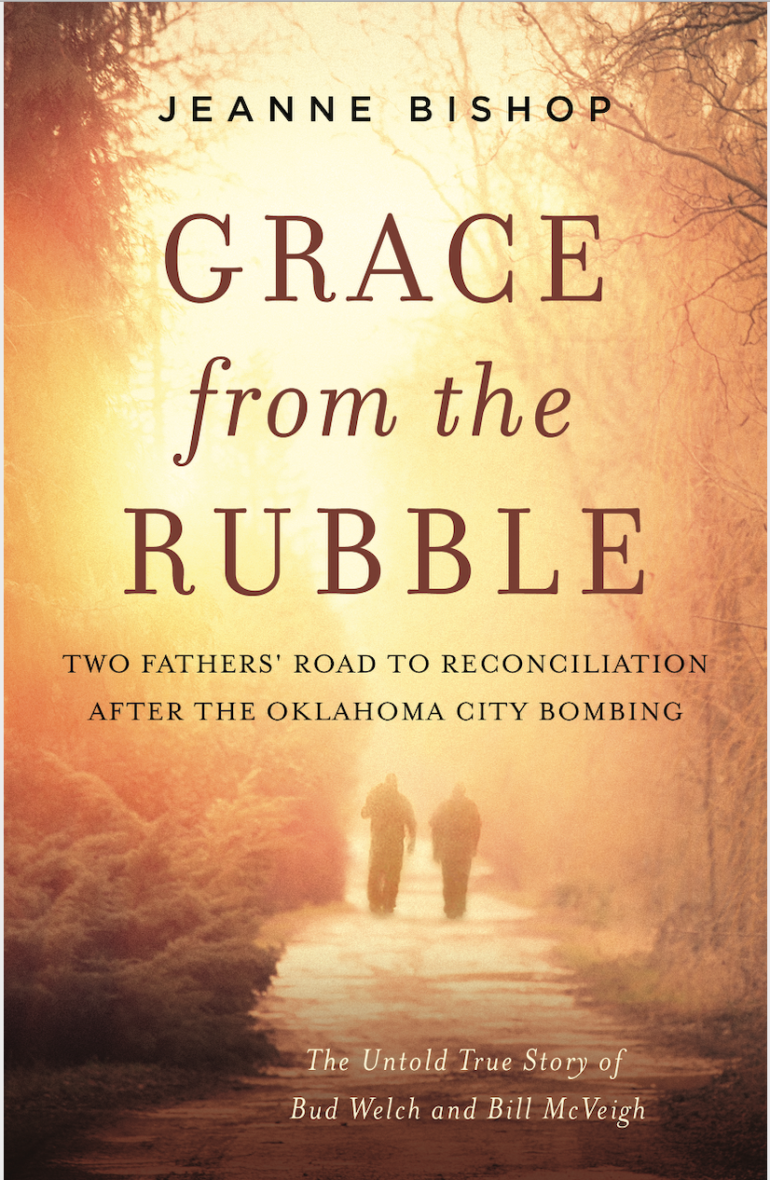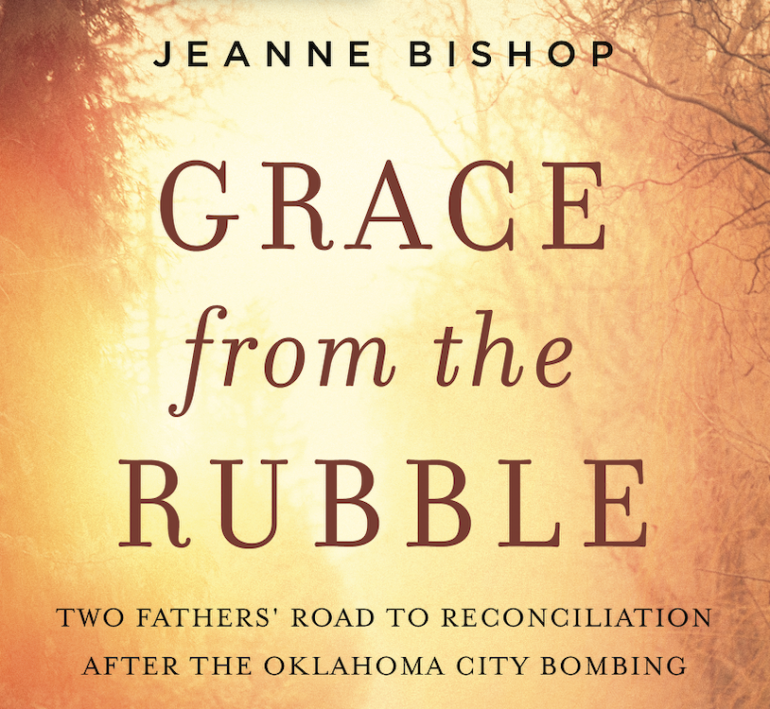I believe in the power of a story.
Here is mine. When my 25-year-old sister Nancy, her husband Richard and their unborn baby were murdered on Chicago’s North Shore in 1990, it took six months to find out who had shot them to death. When their killer was arrested, the community was shocked: it was one of our own, a teenaged boy from Winnetka who lived a few blocks away.
He was tried, convicted and sentenced to life in prison without the possibility of parole. When sheriffs led him out of the courtroom, my mother turned to me and said, “We’ll never see him again.”
I was glad of that. I had built a convenient wall up between me and him: on one side, him, the evil murderer, and on the other, me, the good victims’ family member.
God broke down that wall. One by one, people with wiser heads and more generous hearts than mine shared with me words of mercy, of forgiveness and reconciliation.
Chink by chink, the bricks fell to the ground and light poured in. I reached out to Nancy’s killer, writing him a letter telling him that I had forgiven him. He wrote back, confessing to the crime for the first time and making his heartfelt apology. We met and reconciled. I am visiting him in prison still.
I wrote about that journey in my first book, Change of Heart: Justice, Mercy and Making Peace with My Sister’s Killer. I did that because I wanted this one story, my story, to be a witness to this truth: not all victims and their survivors want the harshest possible punishment for wrongdoers. Not all of us want to harbor hate in our hearts. Many of us find greater healing in forgiveness than in vengeance.
I learned something surprising after the book was released: it’s not just about the book. It’s about the conversation stirred by the book, the discussions that spring from the ideas contained in its pages. The joy of the book was that people pondered those ideas, talked about them, sometimes even said they were changed by them. “If you can forgive the person who murdered your sister,” one man told me, “I can forgive my business partner who betrayed me.”
It made me want to tell more stories of the astonishing forgiveness and mercy I see out there in the world. One of the most powerful stories I know, and one I’m grateful to share, is the one I tell in my new book, Grace from the Rubble: Two Fathers’ Road to Reconciliation after the Oklahoma City Bombing (Zondervan 2020). It’s the true story of two fathers on opposite sides of that tragedy.

Twenty-five years ago on a sunny April morning, Timothy McVeigh, 26, detonated a truck bomb filled with explosives next to the federal building in Oklahoma City. The explosion ripped off the building’s glass front, killing 168 people, including 19 children, most from the day care on the building’s second floor. The attack shocked the nation and the world. It was the deadliest strike on American soil since Pearl Harbor. The Oklahoma City bombing remains the most lethal act of domestic terrorism in U.S. history.
I grew up in Oklahoma City. My family moved there when I was little; I lived there till I left for college at Northwestern University’s Medill School of Journalism. OKC is a modest, heartland city that grew out of a prairie settler tradition of neighbor helping neighbor. The attack on such a place seemed unfathomable in its cruelty. But from that cruelty came a story of great kindness: the story of two fathers touched by the tragedy, Bud Welch and Bill McVeigh.
Bud Welch is a former gas station owner from Oklahoma City whose only daughter, Julie, 23, died in the bombing. She worked at the building as a translator for the Social Security Administration, but had dreams of becoming a Spanish teacher and marrying her serious boyfriend, an Air Force lieutenant.
Bill McVeigh is a former auto parts worker from Western New York whose only son, Tim, set off the bomb. Tim went from high school graduation to low-paying jobs to a stint in the Army, where he served in the Gulf and Iraq. He came home with post-traumatic stress and Army buddies who had helped poison him with violent rhetoric and anti-government extremism.
Those two fathers, Bud and Bill, should have been enemies. Instead, they became enduring friends. Grace from the Rubble tells how that happened, in a journey that is a mix of history, biography, suspense, love story and courtroom drama. It’s also part memoir, about my childhood memories of Oklahoma City and people I grew up with: Megan Mullally, Suzy Amis Cameron and Oklahoma City Thunder executive Clay Bennett.
Bud tried unsuccessfully to meet with Timothy McVeigh, who was under a sentence of death for his crime. Bud reached out instead to Tim’s heartbroken father, Bill McVeigh. Bud told Bill this, in a breathtaking expression of mercy: I don’t hate you. I don’t hate your son. I don’t blame you for what he did. I don’t want him to die, and I’ll do everything I can to prevent it.
The two men walked in Bill’s backyard garden; they sat and talked for hours at his kitchen table. They discovered all they had in common—both raised on farms in big, Irish Catholic families; both in Catholic schools all the way through high school; both working men who never went to college; born only months apart; each with three children. Bud and Bill, a man grieving and a man about to grieve, found common ground in the worst kind of grief there is: the loss of a child.
I dedicate the book to my father, Lee Bishop, who showed my two sisters and me the same unshakable love that Bud and Bill showed their children. But I also dedicate it to my two sons, Brendan, a college student at the U.S. Naval Academy, and Stephen, a sophomore at New Trier High School, because they will be carrying this witness to the power of love into the future.
Researching the book was a joy, because it gave me a chance to return to my hometown of Oklahoma City, interviewing people like the Governor of Oklahoma at the time of the bombing, Frank Keating; visiting the beautiful memorial and museum that now stand on the site of the bombing; and learning the stories of heroism, sacrifice and unity from that terrible day. The stories of those 168 people, from little Zackary Taylor Chavez in the day care to Calvin and Peola Battle, a loving couple planning their retirement at the Social Security office, will live in my heart forever.
I write in the preface to Grace From the Rubble, “Few people are transformed by argument. Everyone, though, has been transformed by a story—our lived experience or the narrative of a life around us. Those linger long after the telling is done.”
I tell this story as a testament that even after tragedy, there can be redemption; after heartrending loss, solace; and after great hurt, forgiveness. There is grace for us all.
More from Better:
- You Said It: Education Innovation in Response to COVID-19 Must Continue
- Right Now Is the Best Worst Time for Estate Planning – Here’s How to Take Advantage
- Can You Be Happy During A Pandemic? Research Says Yes
 Jeanne Bishop is the sister of Nancy Bishop Langert, who was murdered in 1990 along with her husband and their unborn baby. Since the murders of her family members, Jeanne has been a passionate voice for forgiveness and mercy, particularly in the criminal justice system. Jeanne appears in several documentaries, two TEDx talks and the CBS 48 Hours segment “Road to Redemption.”
Jeanne Bishop is the sister of Nancy Bishop Langert, who was murdered in 1990 along with her husband and their unborn baby. Since the murders of her family members, Jeanne has been a passionate voice for forgiveness and mercy, particularly in the criminal justice system. Jeanne appears in several documentaries, two TEDx talks and the CBS 48 Hours segment “Road to Redemption.”
A graduate of Northwestern University’s journalism and law schools, Jeanne was also a Visiting Student at Yale Law School. She is a public defender in Chicago and an adjunct law professor in trial advocacy at Northwestern, where she received the school’s alumni award for pubic service.
Jeanne has written widely in newspapers and magazines, online sites such as HuffingtonPost and CNN.com, law journals and academic books. She is the author of a memoir, Change of Heart: Justice, Mercy and Making Peace with My Sister’s Killer (Westminster John Knox Press 2015) and the recently released Grace From the Rubble: Two Fathers’ Road to Reconciliation After the Oklahoma City Bombing (Zondervan 2020), named by Publishers Weekly as one of its Top Ten Religion and Spirituality Books for Spring 2020.
Jeanne lives on Chicago’s North Shore with her two sons.

